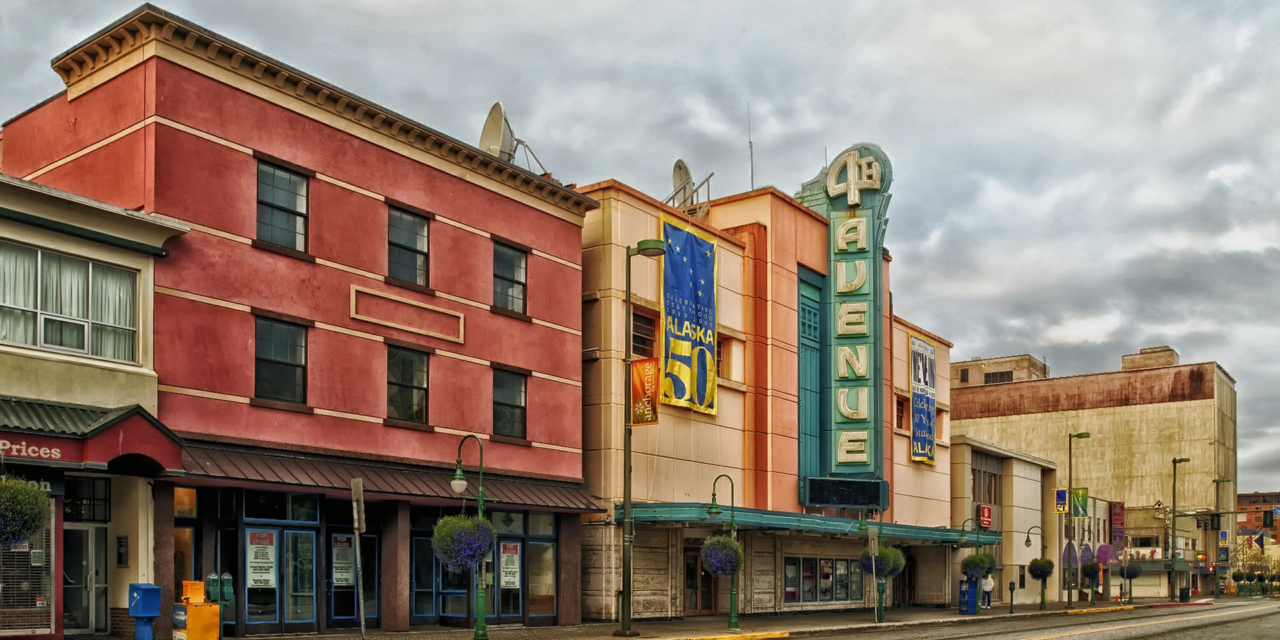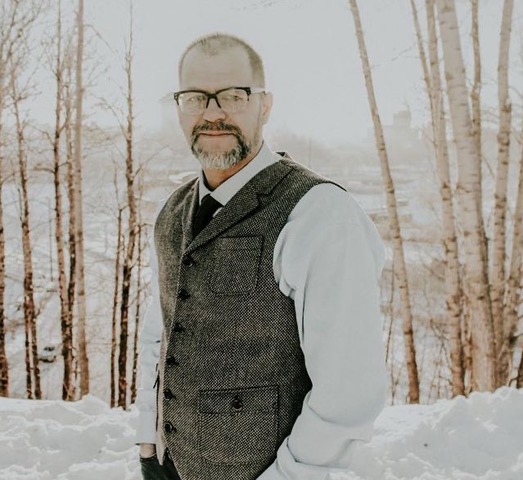One of the things I love about walking around downtown Anchorage is the smell. It’s not often one describes an urban area as having a pleasant bouquet, but Alaska’s largest city is different. Due to the wood-fired ovens of a popular local restaurant, the downtown area is often enveloped in the aroma of alder wood smoke. As you walk, if the wind is just right, you can catch a whiff as the fragrance wafts throughout the city’s small cluster of tall buildings.
I’ve had cause to think about the characteristic scents of my city, in light of the news reports about people losing their sense of smell after contracting Covid. Scientists have long thought that salmon know how to navigate home to the stream where they were born based on smell. Without smell, would I know my home? Would it affect my sense of the identity of this place if I were unable to smell the alder smoke, or the distinct odor of the forest as it slips from summer into fall, or the crisp clean, nearly menthol air of a clear arctic day with temperatures so cold it freezes your nose hairs?
The Scent of Controversy
In Anchorage, as in so many places in the US, the physical impacts of Covid have been obscured by the politics of the virus. At the time this piece was written, Anchorage was in the midst of the worst Covid-19 outbreak of the pandemic, with hospitals maxed out and forced to ration care. In response, the city government proposed a controversial mask mandate. Over a series of nights, the city assembly heard public comment on the proposed mandate; predictably, throngs of protestors lined up to record their comments.
The local newspaper chronicled the hearings, describing them as “tumultuous” and “marked with tension and frequent outbursts.” During one particularly riotous night of testimony, those opposed to the proposed mask ordinance wore yellow Star of David patches in reference to the Holocaust. The patches symbolized their belief that Covid restrictions are the beginning of a slippery slope leading to the recall of freedoms and the creation of a Nazi-like state. When one man was removed for disorderly conduct, it was discovered he was carrying a concealed gun. Another man was removed for yelling a homophobic slur at the Assembly Vice Chair. In addition to the live testimony over multiple nights, thousands of citizens provided written testimony. Former members of the city assembly went on record saying this was the single worst assembly fight in the past 50 years. The contentious public fight left a bad taste in the mouths of many in Anchorage. But I wonder if it has left us unable to smell.
In chapter two of Paul’s Second letter to the Corinthians he describes Jesus and the people who follow him as an aroma. They carry the aroma of the coming shalom kingdom of which Jesus preached. Paul says it is a pleasing aroma. The aromatic aura of the Christ stands in contrast to the olfactory assault of the division in the city. It sits counter to the odor of discord, the pungency of threats and violence, and the stink of hate. It seems that as a people we have lost the sense of smell, or have been so overpowered by the effluvium of the moment we can no longer smell the aroma Paul was writing about.
Art Produces the Aroma of Shalom
But how does one learn to smell the aroma of Christ once again? How does one sniff out the coming shalom kingdom of God? How does a city begin to dream of a different reality? One answer is art.
The artist and author Makoto Fujimura writes, “I am convinced that art and music, while not the Thing itself, contain the aroma, the actual aroma, of the New. Artists, whether cognizant of Christ or not, detect this aroma.” In the midst of a divided city, during the rancor of public debate, into vitriol stepped a community organization asking a question in the form of participatory art installations across the city.
That organization, Anchorage Urban Training Collaborative (AUTC), is committed to training the heads, hearts, and hands of Anchorage leaders so that they might better love their city and seek its peace. The organization understands peace as the biblical concept of shalom—everything the way it’s supposed to be for all people (borrowed from Cornelius Plantinga Jr.)—and sees anyone seeking this vision as a leader. One way they seek to help people fall in love with Anchorage is through the AnchorED City podcast. The most recent season of the podcast focused on places where things are, or are becoming, the way they are supposed to be for all people in Anchorage. The podcast explored hopeful places. Places where one school, in one neighborhood, is breaking down barriers; where religious leaders who could be at odds are instead in conversation; where those caught in sex trafficking are being helped to escape; where businesses are seeking the good of the community and not just profit; and where the potential for leadership of our city is changing to reflect the city’s diversity.
Those topics were just the places the producers saw the city becoming the way it was supposed to be. But what did the citizens of Anchorage think? We decided to put the question to them.
We approached a popular local coffee shop chain to see if they would allow the use of their cafés as places to ask the residents of the city what shalom might look like. The cafés immediately caught the vision. We placed chalkboards in eight locations across the city with the prompt, “For Anchorage to be the way it is supposed to be for all people, I Imagine . . .” Responses on the boards were wide ranging. People wrote, “I imagine…”
…more dancing and music.”
…healthcare for all.”
…a broken world restored”
…decolonized education.”
…housing for everyone.”
…more bikes, fewer cars.”
…access to mental health care.”
…civility.”
…an indoor beach!”
We monitored the boards to make sure the content didn’t become offensive, but this was much easier than expected. The baristas at the cafes were shocked. For example, one of them shared:
“I honestly was expecting to have to deal with more problematic people writing profane things up on the boards, and having to make sure to take them down and police [the boards] a lot more. But it actually ended up being incredibly productive. I only had to erase a couple [of responses] throughout the two-month period. And it was really lovely because people actually started engaging more in conversations with each other based off of what was being read.”
Inviting the people of Anchorage to dream of what shalom might look like through a participatory art project turned all who took part into artists. In Fujimura’s understanding, they became the ones who could smell the aroma of the coming New—the shalom kingdom. The act of asking a question and turning coffee-seeking citizens into artists became an act of re-learning to smell the aroma of Christ. Each person, by picking up a marker and sharing their vision, began helping the city smell again.
Hoping for Small Successes
AUTC plans to compile the answers (more than 500 responses) and present the findings to leaders and decision makers in the city for their consideration. It’s hard to know what will come from that. It is our hope that those with power to make change in the city will be able to hear the voice of the people as they imagine the future. We would love to be able to point to, for example, increased access to mental health care or a different approach to homelessness (both mentioned by contributors often) as coming into being from the Imagine project. But it occurs to me that, while the big outcomes would be great, perhaps an important outcome has already taken place.
In Western thinking, the kind that dominates Anchorage, it is often said that “bigger is better.” It’s why those of us steeped in that thinking like a story where something starts small and grows into something big. I know I like that narrative and would like for AUTC’s project to change the city in a big way. However, I’m not sure that is the correct way to write the story. In a quote I think of often, Shane Claiborne writes, “God’s Kingdom grows smaller and smaller as it takes over the world.” What if the act of putting up chalkboards to hear the voice of the people, not in vitriolic public testimony but in a still small voice, is making the city the way it’s supposed to be? What if the method is the message? What if the kingdom comes in small, almost imperceptible ways?
Many people walk the streets of Anchorage each year—residents and visitors, alike. They might marvel at people fishing for trophy salmon in the urban core or ponder a city so close to a vast wilderness. They might feel dwarfed by the tall buildings or the mountains on the horizon. They may savor one of the many food offerings or revel in a local craft-brewed beer. They might hear a raven’s call or an airplane overhead. In the summer, the midnight sun might warm their faces and in the winter a chill might drive them indoors. When they return to their homes, they might very well tell stories of catching a fish or recount the natural beauty. They may pass along tales of a meal or the uniqueness of an urban wilderness. But will they mention the smell? Will they recall the scent of alder wood smoke in the air? Even better, do we dare hope that our city might be associated with the aroma of shalom?
For more on the project described in this article and to see more responses from the boards go to: www.anchorageutc.org/allpeople.


